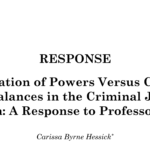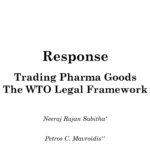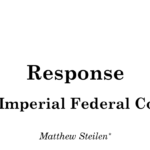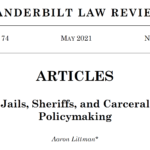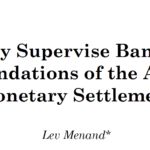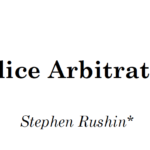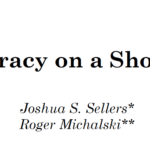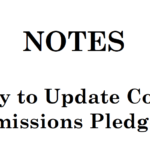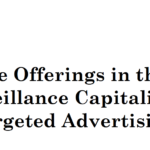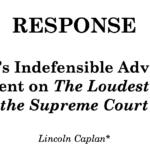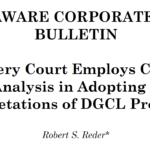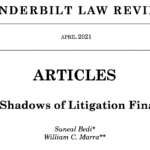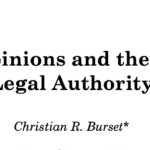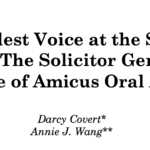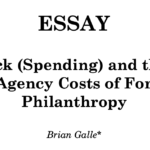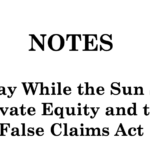Volumes Category
Separation of Powers Versus Checks and Balances in the Criminal Justice System: A Response to Professor Epps
Jul. 19, 2021—Carissa Byrne Hessick | 74 Vand. L. Rev. En Banc 159 (2021) | Separating powers between the three different branches of government serves an important role in the criminal justice system: It helps to protect individual liberty. Separation of powers provides that protection because it requires multiple and diverse actors to agree that a person...
Trading Pharma Goods The WTO Legal Framework
Jul. 6, 2021—Neeraj Rajan Sabitha & Petros C. Mavroidis | 74 Vand. L. Rev. En Banc 145 (2021) | In their thoughtful piece, Thomas Bollyky and Aaron Kesselheim advance an argument aimed to solve the persistent shortages in generic drugs in the United States.1 We want to take one step back and provide a complementary argument regarding...
Our Imperial Federal Courts
Jun. 20, 2021—Matthew Steilen | 74 Vand. L. Rev. En Banc 125 (2021) | “The article is significant for the archival work alone. It is useful, as well, for the impressive synthesis of the existing secondary literature, collected in the footnotes, which makes a convenient reading list for us mere mortals. The argument of the article is ambitious....
Jails, Sheriffs, and Carceral Policymaking
May. 28, 2021—Aaron Littman | 74 Vand. L. Rev. 861 (2021) | The machinery of mass incarceration in America is huge, intricate, and destructive. To understand it and to tame it, scholars and activists look for its levers of power—where are they, who holds them, and what motivates them? This much we know: legislators criminalize, police arrest,...
Why Supervise Banks? The Foundations of the American Monetary Settlement
May. 28, 2021—Lev Menand | 74 Vand. L. Rev. 951 (2021) | Administrative agencies are generally designed to operate at arm’s length, making rules and adjudicating cases. But the banking agencies are different: they are designed to supervise. They work cooperatively with banks and their remedial powers are so extensive they rarely use them. Oversight proceeds through...
Police Arbitration
May. 28, 2021—Stephen Rushin | 74 Vand. L. Rev. 1023 (2021) | Before punishing an officer for professional misconduct, police departments often provide the officer with an opportunity to file an appeal. In many police departments, this appeals process culminates in a hearing before an arbitrator. While numerous media reports have suggested that arbitrators regularly overturn or...
Democracy on a Shoestring
May. 28, 2021—Joshua S. Sellers & Roger Michalski | 74 Vand. L. Rev. 1079 (2021) | Democracy requires money. Voters must be registered, voting rolls updated, election dates advertised, voting technology purchased and tested, poll workers trained, ballots designed, votes counted and verified, and on and on. Despite the importance of election expenditures, we have a shamefully...
The Duty to Update Corporate Emissions Pledges
May. 28, 2021—Nathan Campbell | 74 Vand. L. Rev. 1137 (2021) | Facing both internal and external market pressures, a rapidly growing number of private companies are making public, voluntary, and ambitious pledges to reduce or outright eliminate by a certain date or benchmark their greenhouse gas emissions. Yet, ambition and necessity notwithstanding, nonfulfillment of these emission...
Private Offerings in the Age of Surveillance Capitalism and Targeted Advertising
May. 28, 2021—Christina M. Claxton | 74 Vand. L. Rev. 1187 (2021) | Social media platforms, as well as the internet more broadly, have fundamentally altered many aspects of modern life. In particular, platforms’ targeted advertising mechanisms have revolutionized how companies reach consumers by providing advertisers more effective tools for reaching consumers and by tailoring content to...
The SG’s Indefensible Advantage: A Comment on The Loudest Voice at the Supreme Court
May. 4, 2021—Lincoln Caplan | 74 Vand. L. Rev. En Banc 97 (2021) | It is time for a fundamental reconsideration of the SG’s role—by outstanding scholars like Richard Lazarus, Michael McConnell, Joshua Schwartz, David Strauss, and others who have practiced law in the SG’s office and have studied and written about the role; by other scholars...
Chancery Court Employs Context-Driven Analysis in Adopting Nuanced Interpretations of DGCL Provisions
Apr. 29, 2021—Robert S. Reder | 74 Vand. L. Rev. En Banc 85 (2021) | In Stream TV, Vice Chancellor Laster addressed aspects of the DGCL which previously had received scant attention in the Delaware courts. Employing a context-driven approach to statutory interpretation, the Vice Chancellor arrived at nuanced explanations of two provisions of the DGCL whose...
The Shadows of Litigation Finance
Apr. 20, 2021—Suneal Bedi & William C. Marra | 74 Vand. L. Rev. 563 (2021) | Litigation finance is quickly becoming a centerpiece of our legal system. Once a dispute arises, litigants may seek money from third-party financiers to pay their legal bills or monetize their claims, and in turn those financiers receive a portion of any...
Advisory Opinions and the Problem of Legal Authority
Apr. 20, 2021—Christian R. Burset | 74 Vand. L. Rev. 621 (2021) | The prohibition against advisory opinions is fundamental to our understanding of federal judicial power, but we have misunderstood its origins. Discussions of the doctrine begin not with a constitutional text or even a court case, but a letter in which the Jay Court rejected...
The Loudest Voice at the Supreme Court: The Solicitor General’s Dominance of Amicus Oral Argument
Apr. 20, 2021—Darcy Covert & Annie J. Wang | 74 Vand. L. Rev. 681 (2021) | The Solicitor General (“SG”) is often called the “Tenth Justice,” a title that captures his unique relationship with the Supreme Court and his independence from the executive branch. No phenomenon better reflects this relationship than the Court’s practice of permitting amici...
The Quick (Spending) and the Dead: The Agency Costs of Forever Philanthropy
Apr. 20, 2021—Brian Galle | 74 Vand. L. Rev. 757 (2021) | American philanthropic institutions control upwards of a trillion dollars of wealth. Because contributions to these entities are deductible from both income and estate taxes, and the entities’ earnings are tax-free, that trillion dollars is heavily underwritten by contemporary taxpayers. Law offers little assurance that those...
Make Hay While the Sun Shines: Private Equity and the False Claims Act
Apr. 20, 2021—Gregory F. Maczko | 74 Vand. L. Rev. 797 (2021) | For years, the federal government has used the False Claims Act to police fraud in the healthcare industry. Every year, the Department of Justice recovers billions of dollars from healthcare companies for their False Claims Act violations, both penalizing wrongdoers and providing incentives for...
